#hitler-ludendorff-putsch
Explore tagged Tumblr posts
Text
Der 09. November - Der Tag der Deutschen
Kaum ein anderer Tag vereint so viele, für unser Land historisch bedeutsame Ereignisse wie dieser
09.11.1848 - standrechtliche Hinrichtung von Robert Blum
Der republikanische Abgeordnete der Frankfurter Nationalversammlung wird, obgleich er unter parlamentarischer Immunität steht, bei Wien erschossen. Seine Hinrichtung gilt als Symbol für die Niederschlagung der Deutsche Revolution 1848/1849 durch die reaktionären herrschenden Kreise.
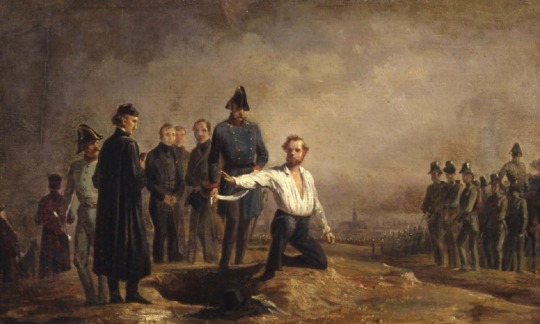
09.11.1918 - die Proklamation der Republik in Berlin
Während der Novemberrevolution 1918 ruft von einem Fenster des Reichstagsgebäudes aus der sozialdemokratische Abgeordnete Philipp Scheidemann die “deutsche Republik” aus. Drei Stunden später proklamiert der Sozialist Karl Liebknecht vor dem Berliner Stadtschloss die “Freie Sozialistische Republik Deutschland”.
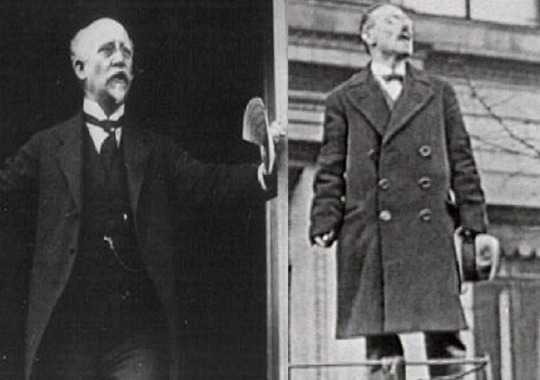
09.11.1923 - Hitler-Ludendorff-Putsch in München
In München putscht ein bis dahin unbekannter rechtsradikaler Demagoge namens Adolf Hitler im Verein mit dem reaktionären General Erich Ludendorff gegen die Weimarer Republik. Sein Versuch, die rechtsstaatliche Ordnung analog zu Benito Mussolini in Italien durch einen “Marsch auf Berlin” zu beseitigen, scheitert vor der Feldherrenhalle am Odeonsplatz durch den bewaffneten Einsatz der bayrischen Landespolizei. Vier Polizisten, ein unbeteiligter Passant und fünfzehn Putschisten sterben. Erstmalig werden die Nationalsozialisten einer breiteren Öffentlichkeit bekannt.
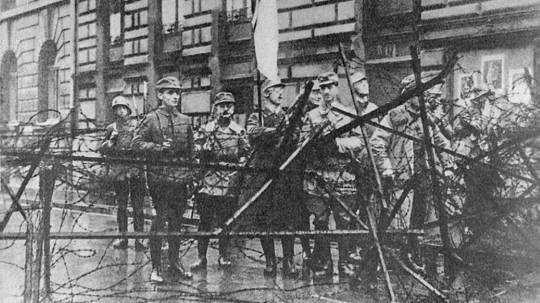
09.11.1938 - Reichspogromnacht
Die Novemberpogrome mit etwa 400 Todesopfern, 1.406 zerstörten Synagogen und jüdischen Gebetsstuben markieren den endgültigen Übergang von der gesellschaftlichen Diskriminierung der jüdischen Bürger im nationalsozialistischen Deutschland zur offenen Gewaltanwendung, die schließlich im Holocaust endete.
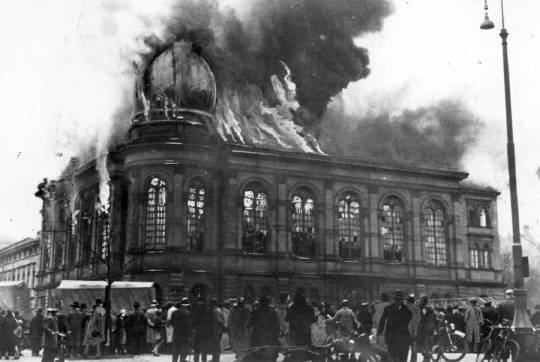
09.11.1989 Der Fall der Berliner Mauer
Auf einer bis dahin eher langweilig verlaufenen Pressekonferenz verliest das SED-Politbüromitglied Günter Schabowski gegen 7 Uhr abends auf Nachfrage des italienischen Journalisten Riccardo Ehrmann einen neuen Entwurf über Reisemöglichkeiten für DDR-Bürger.
Der etwas umständliche Wortlaut ist folgender: “Privatreisen nach dem Ausland können ohne Vorliegen von Voraussetzungen (Reiseanlässe und Verwandtschaftsverhältnisse) beantragt werden. Die Genehmigungen werden kurzfristig erteilt. Die zuständigen Abteilungen Pass- und Meldewesen der der Volkspolizeikreisämter in der DDR sind angewiesen, Visa zur ständigen Ausreise unverzüglich zu erteilen, ohne dass dafür noch geltende Voraussetzungen für eine ständige Ausreise vorliegen müssen. Ständige Ausreisen können über alle Grenzübergangsstellen der DDR zur BRD erfolgen.”
Der Reporter der “Bild”-Zeitung Peter Brinkmann fragt nach, ab wann dies in Kraft trete. Schabowski, der über den genauen Inhalt der neuen Regelung, die eine Sperrfrist beinhaltet, nicht informiert ist, da er bei deren Beschlussfassung nicht anwesend war, antwortet daher: „Das tritt nach meiner Kenntnis – ist das sofort, unverzüglich.“
Während das Fernsehen der DDR in nüchternen Worten über den Fakt der neuen Reisemöglichkeiten informiert, ist für Hanns Joachim Friedrichs während seiner Moderation der “Tagesthemen” die historische Bedeutsamkeit sofort ersichtlich: “Die DDR hat mitgeteilt, dass ihre Grenzen ab sofort für jedermann geöffnet sind. Die Tore in der Mauer stehen weit offen.“
Im Laufe des Abends versammeln sich immer mehr Menschen vor den Berliner Grenzübergängen und verlangen friedlich aber lautstark das ihnen neu zustehende Recht.
Eine halbe Stunde vor Mitternacht befiehlt Oberstleutnant Harald Jäger, der zuständige Leiter der Grenzübergangsstelle Bornholmer Straße, von seinen Vorgesetzten mit einer Entscheidung allein gelassen und mit den Menschenmassen vor der Grenzübergangsstelle konfrontiert, eigenmächtig, sofort alle Kontrollen einzustellen und die Schlagbäume zu öffnen. Bis Mitternacht folgen alle weiteren Berliner Grenzübergangsstellen seinem Vorbild.
Kein einziger Schuss ist gefallen, niemand wurde verletzt. Tausende einander völlig fremde Menschen fallen sich weinend vor Glück in die Arme.
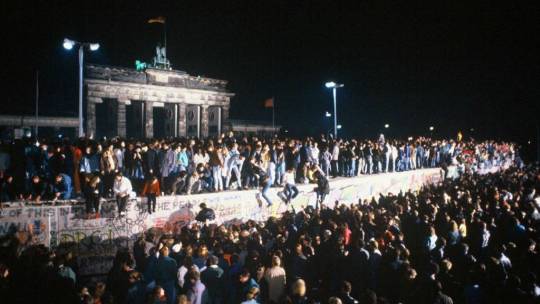
#deutschland#09.11.#deutsche geschichte#hinrichtung von robert blum#proklamation der republik#hitler-ludendorff-putsch#reichspogromnacht#mauerfall#germany#history
13 notes
·
View notes
Video
ERICH LUDENDORFF-ARTE-PINTURA-RETRATOS-GENERAL-EJERCITO-ALEMANIA-PERSONAJES-MILITARES-PRIMERA GUERRA MUNDIAL-PINTOR-ERNEST DESCALS por Ernest Descals Por Flickr: ERICH LUDENDORFF-ARTE-PINTURA-RETRATOS-GENERAL-EJERCITO-ALEMANIA-PERSONAJES-MILITARES-PRIMERA GUERRA MUNDIAL-PINTOR-ERNEST DESCALS- El gran general ERICH LUDENDORFF del ejército de Alemania en la Primera Guerra Mundial, figura militar que se hizo célebre en la victoria de Tannenberg que logró la victoria ante los soldados del Imperio Ruso, mas tarde estuvo involucrado en el Putsch de Múnich junto al líder nacionalsocialista Adolf . Pintura de retratos de los personajes militares y políticos alemanes, cuadro del artista pintor Ernest Descals sobre papel de 50x 70 centímetros.
#ALEMANIA#GERMANY#CHARACTERS#HISTORIA#HISTORY#PERSONAJES#EJERCITO#GERMAN ARMY#PRIMERA GUERRA MUNDIAL#ERICH LUDENDORFF#II REICH#MILITARY#MILITARES#GENERAL#PUTSCH#MUNICH#ADOLF HITLER#PORTRAIT#RETRATO#RETRATOS#RETRATAR#PINTAR#PINTANDO#FIGURAS#PRUSIA#PRUSIANOS#WW1#PLASTICA#FINE ART#PAINTING
0 notes
Text
November 9, the fateful day of the Germans in history
Nov 9, 1313: Battle of Gammelsdorf - Louis IV defeats his cousin Frederick the Fair marking the beginning of a series of disputes over supremacy between the House of Wittelsbach and the House of Habsburg in the Holy Roman Empire
Nov 9, 1848: Execution of Robert Blum (a german politician) - this event is said to mark the beginning of the end of the March Revolution in 1848/49, the first attempt of establishing a democracy in Germany
Nov 9, 1914: Sinking of the SMS Emden, the most successful German ship in world war I in the indo-pacific, its name is still used as a word in Tamil and Sinhala for a cheeky troublemaker
Nov 9, 1918: German Revolution of 1918/19 in Berlin. Chancellor Max von Baden unilaterally announces the abdication of Kaiser Wilhelm II and entrusts Friedrich Ebert with the official duties. At around 2 p.m., the Social Democrat Philipp Scheidemann proclaims the "German Republic" from the Reichstag building. Two hours later, the Spartacist Karl Liebknecht proclaims the "German Soviet Republic" from the Berlin City Palace.
Nov. 9, 1923: The Hitler-Ludendorff Putsch (Munich Beer Hall Putsch) is bloodily suppressed by the Bavarian State Police in front of the Feldherrnhalle in Munich after the Bavarian Prime Minister Gustav Ritter von Kahr announces on the radio that he has withdrawn his support for the putsch and that the NSDAP is being dissolved.
Nov 9, 1925: Hitler imposes the formation of the Schutzstaffel (SS).
Nov 9, 1936: National Socialists remove the memorial of composer Felix Mendelssohn Bartholdy in front of the Gewandhaus concert hall in Leipzig.
Nov 9, 1938: November Pogrom / Pogrom Night ("Night of Broken Glass") organized by the Nazi state against the Jewish population of Germany.
Nov 9, 1939: The abduction of two british officiers from the Secret Intelligence Service by the SS in Venlo, Netherlands, renders the British spy network in continental Europe useless and provides Hitler with the pretext to invade the Netherlands in 1940.
Nov 9, 1948: Berlin Blockade Speech - West Berlin mayor Ernst Reuter delivers a speech with the famous words "Peoples of the world, look at this city and recognize that you cannot, that you must not abandon this city".
Nov 9, 1955: Federal Constitutional Court decision: all Austrians who have acquired german citizenship through annexation in 1938, automatically lost it after Austria became sovereign again.
Nov 9, 1967: Students protest against former Nazi professors still teaching at German universities, showing the banner ”Unter den Talaren – Muff von 1000 Jahren” ("Under the gowns – mustiness of 1000 years", referring to the self-designation of Nazi Germany as the 'Empire of 1000 Years') and it becomes one of the main symbols of the Movement of 1968 (the German Student Movement).
Nov 9, 1969: Anti-Semitic bomb attack - the radical left-winged pro-palestinian organization “Tupamaros West-Berlin” hides a bomb in the jewish community house in Berlin. It never exploded though.
Nov 9, 1974: death of Holger Meins - the member of the left-radical terrorist group Red Army Faction (RAF) financed in part by the GDR that eventually killed 30 people, dies after 58 days of hunger strike, triggering a second wave of terrorism.
Nov 9, 1989: Fall of the Berlin Wall - After months of unrest, demonstrations and tens of thousands escaping to West Germany, poorly briefed spokesman of the newly formed GDR government Günter Schabowski announces that private trips to non-socialist foreign countries are allowed from now on. Tens of thousands of East Berliners flock to the border crossings and overwhelm the border guards who had not received any instructions yet because the hastily implemented new travel regulations were supposed to be effective only the following day and involved the application for exit visas at a police office. Subsequently, crossing the border between both German states became possible vitrually everywhere.
231 notes
·
View notes
Photo

Beer Hall Putsch
The Beer Hall Putsch or Munich Putsch was a failed attempt by the German National Socialist (Nazi) Party to seize power, first of the Bavarian and then the German federal government on 8-9 November 1923. The coup, led by Adolf Hitler (1889-1945), failed because other right-wing politicians, the police, and the army did not give their support.
The Nazis & the Crisis of 1923
Hitler became leader of the Munich-based NSDAP (National Socialist German Workers' Party) in 1921, taking over from Anton Drexler (1884-1942). The party was neither socialist nor at all interested in workers, but Hitler had chosen the name to give his ultra-nationalist party as wide an appeal as possible. Known as the Nazi Party, it was also vehemently anti-Semitic and against the German establishment, which it saw as the root of all ills, everything from the signing of the humiliating Treaty of Versailles which formally closed the First World War (1914-18) to hyperinflation. The Weimar Republic, as Germany was now known, was beset by weak coalition governments, which struggled to cope with a series of severe post-war challenges. By 1923, the Nazi Party had over 55,000 members, although this was much fewer than the Social Democratic Party, for example, which had 1.2 million members.
In the summer of 1923, the German government was in the middle of yet another crisis. France had invaded parts of the heavily industrialised Ruhr in western Germany in order to force the country to make good on its obligations to pay France war reparations. The government declared a state of emergency, and the army was given chief executive power. In Munich, the leader of the local government, Gustav Ritter von Kahr (1862-1934), the local army chief, and the chief of the police force were all given extraordinary powers to deal with the crisis. All were right-wing in political orientation, and Hitler saw this as an opportunity to take power, or, even better, to force an invitation to take power from what he considered like-minded politicians and army figures. Hitler ultimately intended to march on Berlin, much like the Italian fascist dictator Benito Mussolini (1883-1945) had marched on Rome to seize power in October 1922 (when the Italian king felt obliged to invite him to power). First, Hitler would deal with Munich, and his primary weapon would be his own paramilitary followers.
The Nazis used a paramilitary group, the SA (Sturmabteilung) stormtroopers, to frequently rough up the political opposition and generally strut about looking important. The SA, led by Ernst Röhm (1887-1934), even became too powerful for Hitler's liking, and so he created his own personal bodyguard called the Stosstrupp-Hitler (Hitler Shock Troop). Stosstrupp members included Julius Schreck (1898-1936), Joseph Berchtold (1897-1962), Ulrich Graf (1878-1950), Hermann Göring (1893-1946), and Rudolf Hess (1894-1987). Other key supporters of Hitler included General Erich Ludendorff (1865-1937), the WWI veteran who had found himself out of favour with the Weimar establishment ever since the armistice. Hitler hoped General Ludendorff would be a respectable figurehead for a Nazi-driven coup d'etat.
Nazi Gathering, Bürgerbräukeller
Bundesarchiv, Bild 146-1978-004-12A / Hoffmann, Heinrich (CC BY-SA)
Continue reading...
18 notes
·
View notes
Text
" Quando si guardano indietro, alla ricerca di un’àncora cui vincolare la festa nazionale – una presa della Bastiglia, una Dichiarazione americana d’indipendenza –, tutti i regimi tedeschi si snervano in un sentimento d’inferiorità, alla vana ricerca di un evento luminoso cui sacrificare con cadenza annuale. E non lo trovano. Persino la caduta del Muro non funzionerà. Il 9 novembre è giorno sfortunato nella storia tedesca. Coincide con la resa di Compiègne alla Francia (1918), con il fallito “putsch della birreria” ordito a Monaco da Hitler e Ludendorff (1923), con la notte dei cristalli (1938), prodromo dello sterminio degli ebrei. Si ripiegherà infine sul 3 ottobre, decretato Giorno dell’Unità Tedesca. Atto amministrativo che non scalderà i cuori germanici. Un popolo senza mito non può farsi davvero nazione. La Bundesrepublik era e resta Stato a nazionalità limitata. Per molti un salutare trapasso dal militarismo prussiano al post-nazionalismo europeisticamente corretto. Ma non per tutti. E comunque per sempre meno. "
Lucio Caracciolo, La pace è finita. Così ricomincia la storia in Europa, Feltrinelli (collana Varia), novembre 2022. [Libro elettronico]
#letture#scritti saggistici#saggistica#saggi brevi#geopolitica#Lucio Caracciolo#leggere#citazioni#libri#La pace è finita#DDR#storia del XX secoloa#sovranità#Germania#Bundesrepublik#Deutschland#Cortina di ferro#RDT#presa della Bastiglia#Dichiarazione d’indipendenza americana#muro di Berlino#1989#resa di Compiègne#Grande guerra#prima guerra mondiale#putsch di Monaco#Erich Ludendorff#notte dei cristalli#Giorno dell’Unità Tedesca#miti nazionali
6 notes
·
View notes
Text
https://twitter.com/butchanarchy/status/1348796277379588096
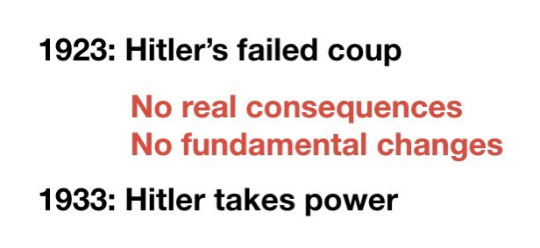
[image ID: four lines of text on a white background that read,
1923: Hitler’s failed coup
No real consequences No fundamental changes
1933: Hitler takes power
/end image ID]
Seeing this image floating around, and while the message it sends is generally true and important (that fascism unchallenged leads to fascism building power), it leaves out important political factors between 1923 and 1933 we should learn from.
So, here’s what happened:
1923 Beer Hall Putsch: Inspired by Mussolini’s March on Rome in 1922, Hitler decides that a coup is the appropriate strategy to seize power in Germany. He had the support of elements of the German military (a crucial point in any coup), most notable among them General Ludendorff.
Their intention was to kidnap leaders of the Bavarian government and to accept Hitler as their leader, and, with the support of WWI General Ludendorff, win over the German military, proclaim national revolt, and bring down the German government in Berlin.
The coup was a total failure. The Bavarian leaders wouldn’t agree to Hitler’s demands until Ludendorff came and personally convinced them to, but word came back that the Nazis’ move to take over the army barracks had failed. Then the Bavarian leaders escape.
However, this WAS an important point in Hitler gaining power. This is because, at his trail, Hitler used the media coverage to get his messages out to the entire German public. The judges for his trial were Nazi sympathizers, and allowed him to talk as long as he wanted.
The court’s verdict? Treason carried a possible life sentence, but he was only committed to 5 years, and served only 9 months, in which he wrote Mein Kampf, had a private cell with a view, was allowed to receive visitors, and had his own private secretary.
After Hitler was released in 1924, he realized that taking power would not be possible without the support of the German Army and other established institutions. So, he decided to enter the world of electoral politics.
On this strategy he said: “Instead of working to achieve power by an armed coup we shall have to hold our noses and enter the Reichstag [...] If outvoting them takes longer than outshooting them, at least the results will be guaranteed by their own Constitution!”
Also important to note the the Nazi Party was organized like a government itself. This was so when they finally seized power over the German State, the Nazi “government in waiting” could slip into place.
1926-1929: Termed “the quiet years” for the Nazi party. The German economy was recovering, and there was overall less unrest to exploit. In these years Hitler consolidated his power within the Nazi Party, but they had a poor showing in the Reichstag elections.
1929: The Wall Street stock market crashes, and decimates economies worldwide. The German economy was especially vulnerable because it was built on foreign capital after WW1. By mid-1930 the German government is totally unravelling under the pressure of the crisis.
New elections are called, and the Nazi party launched a massive campaign. Hitler held rallies and delivered speeches all over Germany. He promised to make Germany great again, stamp out State corruption, and, of course, crack down on Marxism and Jewish people.
On election day September 14, 1930, the Nazis received 6,371,000 votes—over eighteen percent of the total—and were thus entitled to 107 seats in the German Reichstag. The Nazi Party went from the smallest to the second largest political party in Germany.
After their victory, German industrialists began to invest in Hitler in the hope of getting favors when he came to power. This money was used to hire more salaried Nazis and push even more Nazi propaganda. Hitler also made strong alliances with German military leaders.
1932: Hitler runs for President against standing President Hindenburg. The Nazis run an intense campaign but ultimately lose the election and the following run-off. However, they are shown to be wildly popular, having secured 36% of the vote.
Kurt von Schleicher, a German Army officer, meets secretly with Hitler and offered him a deal: A current ban on the SA and SS would be lifted, the Reichstag dissolved, and new elections called, if Hitler would support him in a conservative nationalist government. Hitler agrees.
Schleicher worked behind the scenes (literally so much complicated political intrigue) and get President Hindenburg to fire the current Chancellor, and appoint a relatively unknown socialite, Franz von Papen, in his place.
On June 4th, the Reichstag was dissolved and new elections were called for the end of July. On June 15, the ban on the SA and SS was lifted. In the general election the Nazi party meets more success and becomes the largest party in Germany.
The ban lifted, Nazis hit the streets and are out for blood. Hundreds of gun battles between communists and Nazis erupt all over Germany. In one of the biggest shootouts, the Nazis were literally escorted by police to their attack on a communist area near Hamburg.
1933: Schleicher broke from the Nazis, in an attempt to grab power for himself, and after MUCH political wheeling and dealing, and many false starts, Papen, Hitler, and the president’s son work to convince an ailing President Hindenburg to give Hitler the Chancellorship.
Hindenburg refused and resisted repeatedly, but a false rumor that Schleicher was about to arrest Hindenburg and stage a military takeover of the government spurred him to finally give in. January 30, 1933, Hitler is named Chancellor of Germany, and takes power.
6 notes
·
View notes
Text
The Beer Hall Putsch, also known as the Munich Putsch,[1][note 1] was a failed coup d'état by Nazi Party (Nationalsozialistische Deutsche Arbeiterpartei or NSDAP) leader Adolf Hitler, Generalquartiermeister Erich Ludendorff and other Kampfbund leaders in Munich, Bavaria, on 8–9 November 1923, during the Weimar Republic. Approximately two thousand Nazis marched on the Feldherrnhalle, in the city centre, but were confronted by a police cordon, which resulted in the deaths of 16 Nazis, four police officers, and one bystander.[2][3]
Hitler escaped immediate arrest and was spirited off to safety in the countryside. After two days, he was arrested and charged with treason.[4]
The putsch brought Hitler to the attention of the German nation for the first time and generated front-page headlines in newspapers around the world. His arrest was followed by a 24-day trial, which was widely publicised and gave him a platform to express his nationalist sentiments to the nation. Hitler was found guilty of treason and sentenced to five years in Landsberg Prison,[note 2] where he dictated Mein Kampf to fellow prisoners Emil Maurice and Rudolf Hess. On 20 December 1924, having served only nine months, Hitler was released.[5][6] Once released, Hitler redirected his focus towards obtaining power through legal means rather than by revolution or force, and accordingly changed his tactics, further developing Nazi propaganda.[7]
0 notes
Text
On this day in Wikipedia: Wednesday, 8th November
Welcome, Willkommen, Benvenuto, नमस्ते 🤗 What does @Wikipedia say about 8th November through the years 🏛️📜🗓️?

8th November 2020 🗓️ : Event - Second Nagorno-Karabakh War Second Nagorno-Karabakh War: Azerbaijani forces defeated the self-proclaimed Republic of Artsakh in the Battle of Shusha, reclaiming the town after 28 years. "The Second Nagorno-Karabakh War was an armed conflict in 2020 that took place in the disputed region of Nagorno-Karabakh and the surrounding occupied territories. It was a major escalation of an unresolved conflict over the region, involving Azerbaijan, Armenia and the self-declared Armenian..."
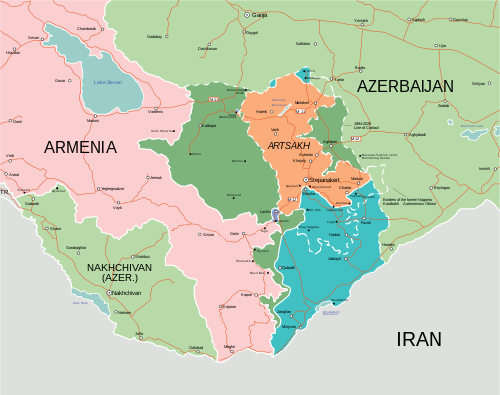
Image licensed under CC BY-SA 3.0? by Kalj, based of File:2020 Nagorno-Karabakh war map.png by User:Golden
8th November 2016 🗓️ : Event - 2016 Indian banknote demonetisation Indian Prime Minister Narendra Modi publicly announces the withdrawal of ₹500 and ₹1000 denomination banknotes. "On 8 November 2016, the Government of India announced the demonetisation of all ₹500 and ₹1,000 banknotes of the Mahatma Gandhi Series. It also announced the issuance of new ₹500 and ₹2,000 banknotes in exchange for the demonetised banknotes. Prime Minister Narendra Modi claimed that the action..."
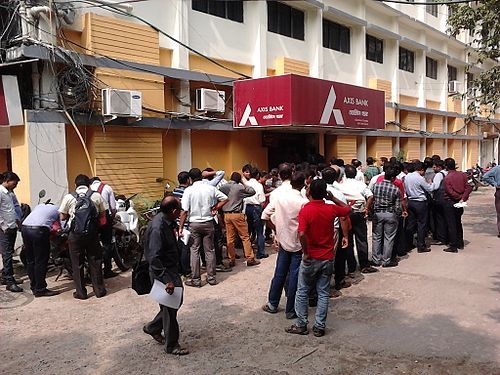
Image licensed under CC BY 3.0? by Biswarup Ganguly
8th November 2013 🗓️ : Event - Typhoon Haiyan Typhoon Haiyan, one of the strongest tropical cyclones ever recorded, strikes the Visayas region of the Philippines; the storm left at least 6,340 people dead with over 1,000 still missing, and caused $2.86 billion (2013 USD) in damage. "Typhoon Haiyan, known in the Philippines as Super Typhoon Yolanda, was one of the most powerful tropical cyclones ever recorded. On making landfall, Haiyan devastated portions of Southeast Asia, particularly the Philippines. It is one of the deadliest Philippine typhoons on record, killing at least..."
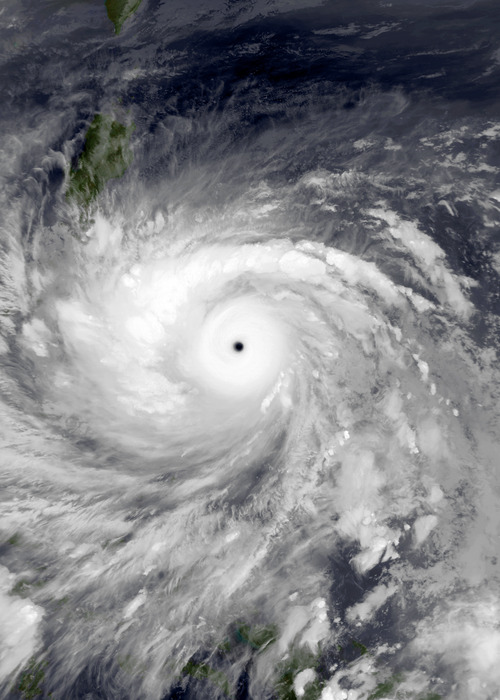
Image by NASA, LAADS Web, HDF File processed by Supportstorm
8th November 1973 🗓️ : Event - John Paul Getty III The right ear of John Paul Getty III is delivered to a newspaper outlet along with a ransom note, convincing his father to pay US$2.9 million. "John Paul Getty III (; born Eugene Paul Getty II; November 4, 1956 – February 5, 2011) was the grandson of American oil tycoon J. Paul Getty, who was once the richest man in the world. While living in Rome in 1973, he was kidnapped by the 'Ndrangheta and held for a $17 million ransom. His..."
8th November 1923 🗓️ : Event - Beer Hall Putsch Beer Hall Putsch: In Munich, Adolf Hitler leads the Nazis in an unsuccessful attempt to overthrow the German government. "The Beer Hall Putsch, also known as the Munich Putsch, was a failed coup d'état by Nazi Party (Nationalsozialistische Deutsche Arbeiterpartei or NSDAP) leader Adolf Hitler, Generalquartiermeister Erich Ludendorff and other Kampfbund leaders in Munich, Bavaria, on 8–9 November 1923, during the Weimar..."
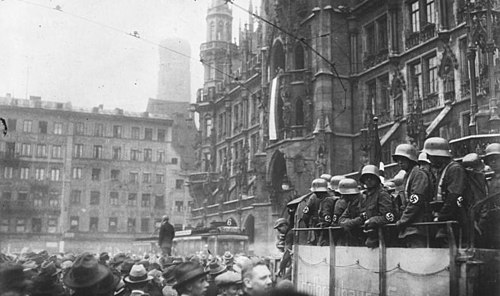
Image licensed under CC BY-SA 3.0 de? by
UnknownUnknown
8th November 1817 🗓️ : Death - Andrea Appiani Andrea Appiani, Italian painter and educator (b. 1754) "Andrea Appiani (31 May 1754 – 8 November 1817) was an Italian neoclassical painter...."
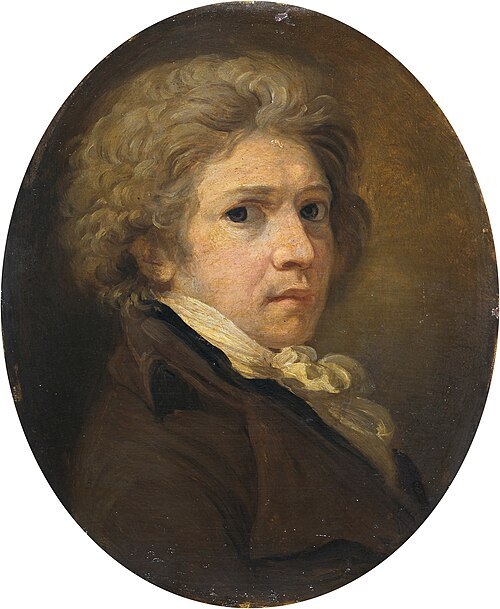
Image by Andrea Appiani
8th November 🗓️ : Holiday - International Day of Radiology (European Society of Radiology) "The International Day of Radiology (IDoR) is an annual event promoting the role of medical imaging in modern healthcare. It is celebrated on November 8 each year and coincides with the anniversary of the discovery of x-rays. It was first introduced in 2012, as a joint initiative of the European..."
0 notes
Text
No Power Left to the Vanquished
My feelings, Conscript Fathers, are extremely different, when I contemplate our circumstances and dangers, and when I revolve in my mind the sentiments of some who have spoken before me. Those speakers, as it seems to me, have considered only how to punish the traitors who have raised war against their country, their parents, their altars, and their homes; but the state of affairs warns us rather to secure ourselves against them, than to take counsel as to what sentence we should pass upon them. Other crimes you may punish after they have been committed; but as to this, unless you prevent its commission, you will, when it has once taken effect, in vain appeal to justice. When the city is taken, no power is left to the vanquished.
- Sallust, quoting Cato the Younger, Bellum Catilinae

In the late years of the Roman Republic, a conspiracy arose from within the ranks of the Senate. The aristocrat Lucius Sergius Catilina attempted to seize control of the government after his bid for consulship failed. One of the consuls, Cicero, exposed the conspiracy and Catilina fled Rome to prepare an army. Five of the conspirators were captured after the letters they wrote, in which they urged people to join the conspiracy, were intercepted. The letters were read before the Senate and Cicero urged for the execution of their authors.
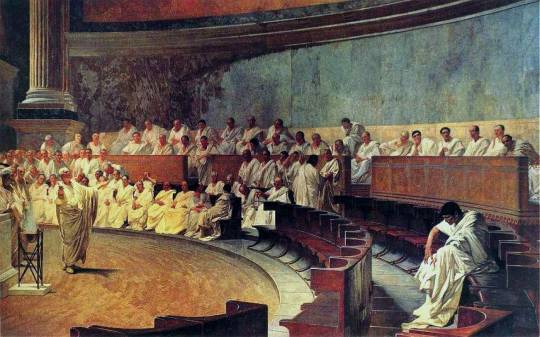
Julius Caesar pled for patience and clemency; after all, Rome had laws and customs to observe. He did not want to set a precedent that the ways of Rome could be set aside because they were inconvenient. Cato the Younger, a longtime (and future) opponent of Caesar, spoke next. His appeal won out because the Senate understood the reality of the scenario he was describing: when an institution is in imminent danger from those who seek to dismantle it, you must question if strict adherence to the institution’s laws and customs is worth more than the existence of the institution itself.
Fourteen years later, Julius Caesar, champion of Roman laws and customs, crossed the Rubicon in defiance of law, custom, and the explicit order of the Senate to mark what would become the end of the Roman Republic and the beginning of Caesar’s rule of the Roman Empire. Caesar’s respect for Roman norms and civitas ended when they put him in personal danger. As for Cato, he died with the republic and subsequently became its most lionized martyr.
In 1923, Adolf Hitler and Erich Ludendorff, accompanied by hundreds of other Nazis and members of the paramilitary Sturmabteilung staged the Beer Hall Putsch, an attempted coupe d'état against the regional Bavarian government. Hitler’s goal was to pressure the elected representatives in Munich to turn against the federal government in Berlin through a public show of force and violence. It failed. Hitler was imprisoned, but he used his trial testimony to continue spreading his propaganda and dictated Mein Kampf while serving his sentence. The Beer Hall Putsch was a success for the Nazi party in spite failing to achieve Hitler’s goals.
Ten years later, Hitler was the presidentially-appointed Reichskanzler of Germany. While the Nazis had the most seats in the Reichstag, it was still a minority party. To ensure the passage of the Enabling Act, which gave the chancellor the power to enact laws without the involvement of the Reichstag, Hermann Göring, President of the Reichstag, suspended the rules for quorum and outlawed the opposition KPD (Communist party) from participating. Sturmabteilung forces entered the assembly chamber to surround and intimidate the non-Nazi representatives into voting for the law. The passage of the Enabling Act marked the end of the Weimar Republic and the beginning of Hitler’s dictatorship over the German Reich.
The differences between the Beer Hall Putsch and and the Enabling Act were differences of organizational power, instruments, and outcome, not intent. In both cases, the same bad actors were seeking to overthrow an existing government. President Paul von Hindenburg and Franz von Papen failed to recognize that Hitler and the Nazis not only threatened the principles of the aristocracy or their other political opponents, but the Weimar Republic itself.
Was the Weimar Republic worth saving? It was, by most accounts, including the little my grandmother remembered of it, an awful state. Its government was, putting it mildly, dysfunctional. Many of its citizens lived through an era of terrible poverty and violence following the end of the first World War. But the Reich is what came after. All other avenues of evolutionary institutional or truly revolutionary change ended with the fall of the republic. The world suffered for it.
Trump and his allies have been attacking American institutions for the last four years. Trump doesn’t have the ideological drive of Hitler or the strategic acumen of Caesar. He just has the most base populist instincts to agitate a mob. What he shares with Hitler, Caesar, and other would-be dictators is a desire to remove opposition and the institutional mechanisms of opposition through whatever means are at his disposal. If he can do it through an executive order, he will. If he can do it through political pressure, he will. If can do it through intimidation, quid pro quo exchanges, and other illegal actions, he will. And if it requires a mob of supporters to storm the capitol during a Senate session to overturn their certification vote, he’ll try use that, too.
People have been likening what happened in the U.S. capitol to the Beer Hall Putsch. It’s a fair and reasonable comparison, though Hitler did actually march in his own coup attempt and was wounded during its defeat; Trump just gathered people together, lit a fuse, and watched them go. But it’s important to remember that the differences between the Beer Hall Putsch and the Enabling Act were of organizational power, instruments, and outcome. What if there had been more pro-Trump agitators at the capitol? What if the Senate had not been evacuated in time? What if Trump had more supporters within the Senate to begin with? What if Trump were even mildly more intellectually competent or the various online factional leaders in his mob were more coordinated in their tactics and goals?
Facebook, twitter, and other social media sites have deplatformed Trump. Several companies have suspended hosting services for online communities that have been involved in coordinating fascist, white supremacist mobs in the past. Trump’s supporters, in ignorance or bad faith, have decried that this violates 1st Amendment rights. They are wrong, but even if they were not, the events of January 6th, planned armed protests on the 17th, and threats of violence against Biden’s inauguration on the 20th, represent the kind of imminent institutional danger that Cato spoke of during the Catiline Conspiracy. “When the city is taken, no power is left to the vanquished.”
We have wrestled with how the government and corporations should moderate social media since these platforms emerged. We will continue to do so in the future. While we must take guard against the transformation of severe actions in time of crisis into the de facto way of handling our day-to-day problems, we must also recognize and act to resolve crises as soon as they appear if we have any interest in preserving the institutions they threaten.
I think of myself as a socialist. My political thought is not as educated, as principled, or as nuanced as many other socialists I know, some of whom think that any efforts to preserve or work within existing American institutions is, at best, naïve; in practice, counterproductive; and, at worst, actively reactionary. I often look at our institutions through the lens of a designer. When I do, I see systems that do not work to produce meaningful social change. I see systems which do not often work to accomplish any goals of its body politic. In practice, our systems serve the needs and interests of the ruling class and the powers that have the means and knowledge to manipulate the members of that class. The systems confine the use of violence and its instruments to the state, as the state sees fit, often to the detriment and mortal peril of the most disadvantaged and vulnerable among us. It is hard for me to sympathize with those who deify the state and its institutions, especially a state like America that treats its citizens so cruelly. It becomes even harder when adjacent political cousins perennially denounce any hesitance to support milquetoast centrist candidates as tantamount to treason. Even so, when fascists, white supremacists, advocates of genocide are positioning themselves to imminently dismantle these institutions through intimidation and violence, it is not difficult for me to see the value in their immediate preservation.
But if the state and its institutions do survive the next few weeks, we will still live in a world where social media and the principles of freedom of speech are vulnerable to the predations of those who would use their contentious legal status to spread lies, foment popular dissent, and, if necessary, coordinate another violent coup d'état when the time is ripe. The next time, perhaps the popular figurehead will not be as ignorant, as incompetent, as craven, as plainly stupid as Donald Trump. You can already see his would-be successors positioning themselves for 2024 in the waning hours of his presidency. The next time, the populist agitators may be more focused in their goals, more coherent in their strategy, more careful in their communication. Those among them who have witnessed the spectacular failure of imbeciles like Jake Angeli, Adam Johnson, and Richard Barnett may be shrewd enough to learn from the disaster as they prepare for the future.
The Weimar Republic became vulnerable to the schemes of the Nazi party because its representatives failed to address the needs of its citizens and because its leaders failed to recognize the magnitude of threat posed by leaders like Adolf Hitler, propagandists like Goebbels, and paramilitary groups like the Sturmabteilung. Our elected representatives may have finally, at this recent brink of disaster, comprehended the threat that Trump and his supporters pose to the existence of the state. After they make their way through January 20th, the federal government will have to address the needs of a disaffected, impoverished, violently-policed, often disenfranchised populace. They will also have to disentangle the mess that the government has created through their laissez-faire attitude toward social and news media regulation. Their actions in the immediate future will tell if they intend to effect meaningful change or if they are content to use the next four years to pave a road to the ruin of the republic.
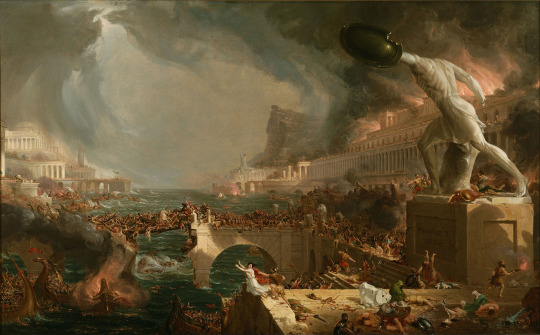
547 notes
·
View notes
Photo
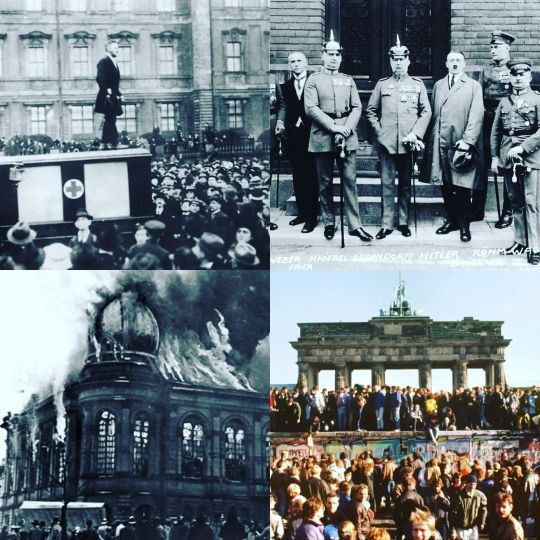
[9. November ~ 4 Bilder ~ 4 Wendepunkte] Es gibt 365 bzw. 366 Tage in einem Jahr, aber manche Tage sind besonders - so wie heute der 9. November. Im letzten Jahrhundert veränderten vier 9. November den Lauf der Geschichte. Klar, uns als erstes ins Gedächtnis kommt der 9. November 1989 mit dem Fall der Berliner Mauer, aber vielleicht fällt uns im 2. Gedanken die Reichspogromnacht ein (vom 9. auf den 10. November 1938). Aber auch der 9. November 1923 sollten wir nicht vergessen, weil da der Hitler-Ludendorff-Putsch stattfand und noch ein Step weiter zurück, da haben wir den 9. November 1918 mit Ausrufung der Republik in Deutschland. Ihr seht, ein Datum, vier sehr nennenswerte historische Ereignisse. #Geschichte #Mauerfall #reichsprogromnacht #hitlerludendorffputsch #republikausrufung #neunternovember https://www.instagram.com/p/CkvskTvDI5P/?igshid=NGJjMDIxMWI=
2 notes
·
View notes
Text
TRAUER-SPIEL
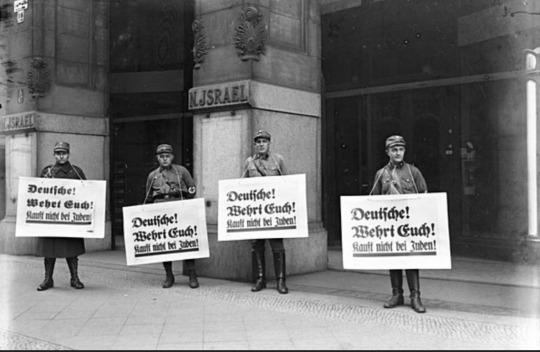
Die deutsche Schuld-und Sühne Seele wird wieder gefordert – von November bis Januar, zum grossen, landesweiten Volkstrauern (mit Ausnahme des „Fests der Freude“ am 24. Dez.) Wir sind zwar seit 1945 in permanenter Trauer; nur, ab dem 9. Nov. wird es wirklich ernst und düster. Gestern war der Auftakt in den Medien und Blogs mit Chroniken der deutschen Untaten, und dem Mauerfallals „Geschenk der…
View On WordPress
#9. November#AfD#Auschwitz#Hitler-Ludendorff Putsch#Judea erklart Deutschland den Krieg#NS Opfer#Reichsprogromnacht#SA#Schwarzbuch des Kommunismus#Weimarer Republik
0 notes
Text
November 9, the fateful day of the Germans
In several years on November 9, significant historical events happened in Germany, which shaped the future of the country. In detail, these are:
1848: Pro democracy revolutionist Robert Blum is executed in Vienna after being convicted for inflammatory speech. His death caused a radicalization of the pro-democracy movement, and he became a prominent identification figure for the early workers’ movement in Germany.
1918: Social Democrat politician Philipp Scheidemann proclaims the German Republic from a window of the Reichstag building in Berlin. A few hours later, Karl Liebknecht, leader of the communist movement, proclaims the Free Socialist Republic of Germany, meant to become a soviet state. During the following violent conflict, which took on civil war-like intensity in some places, the proponents of the pluralistic-democratic model prevail over the campaigners for a soviet republic.
1923: Adolf Hitler and former General Erich Ludendorff initiate the Beer Hall Putsch in Munich in a failed attempt to topple the yound republic. National Socialism makes international headlines for the first time. Hitler uses the following trial to promote himself as the leading figure of the German ethno-nationalist movement. Despite being convicted for five years in prison, he is released after 9 months for good conduct. He writes his infamous book “Mein Kampf” while in prison. November 9 becomes a memorial day during the Third Reich.
1938: The Night of Broken Glass marks the height of the November pogroms against the Jewish population in Germany. More then 1400 synagogues are destroyed, alongside with several thousand shops and homes owned by Jews. Jewish cemeteries are also devastated. About 30,000 Jews are sent to concentration camps where hundreds are killed and thousands die due to the circumstances of incarceration.
1967: During the inaugurational celebrations of the headmaster of the university of Hamburg, students show a poster saying “Unter den Talaren der Muff von 1000 Jahren” (”Under the gowns there is the must of 1000 years”), referring to the self-designation of Nazi Germany as the “1000 year-long empire”. The sentence became the symbol of the the 1968 student revolts in West Germany.
1969: The extreme-left terror organization Tupamaros West-Berlin plants a bomb in the Jewish Community Hall of West Berlin, which does not explode, but would have cause a huge bloodbath among the participants of a memorial service to commemorate November 9, 1938.
1974: Holger Meins, member of the extreme-left terror organization Red Army Fraction (RAF) dies after 58 days of hunger strike, causing a further radicalization of the group and the recruitment of a second generation of RAF terrorists.
1989: Fall of the Berlin Wall: The opening of the border between the two halves of Berlin and subsequently the two German states demonstrates the success of the peaceful revolution in East Germany, which ultimately leads to the reunification of Germany. The first border crossings were opened when huge crowds gathered at the eastern side after an ill-informed spokesman of the new East-German government erroneously told the public that the borders were open “now, with immediate effect”. Unable to reach any superior for receiving orders, the responsible commander of the checkpoint at Bornholmer Straße took the lone decision to open the barriers, feeling unable to disperse the crowd without violence and fearing a stampede in which innocent people would be crushed to death.
November 9 was considered as the national holiday of reunited Germany, but this idea was skipped due to the horrible events connected to national socialism. In the end, the day when the reunification came into effect, October 3, 1990, became the national holiday of Germany.
2K notes
·
View notes
Photo
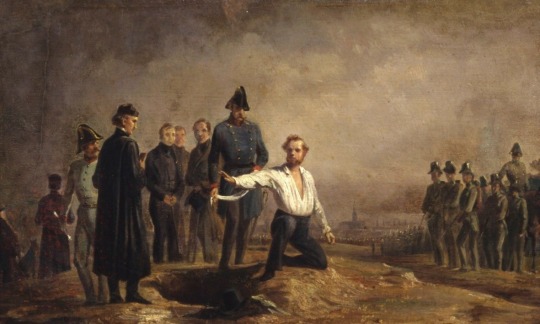
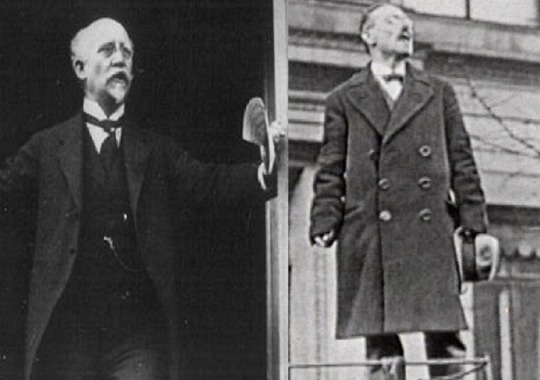
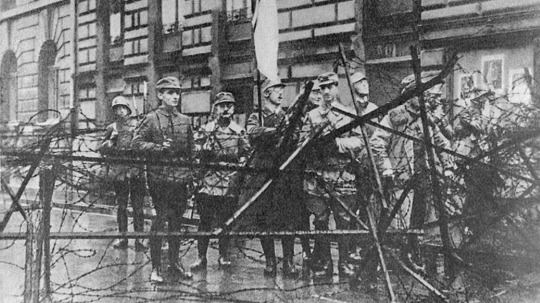
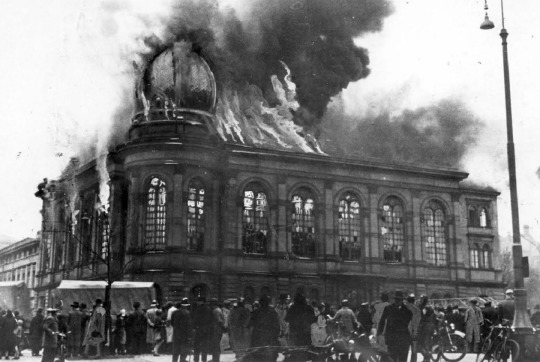
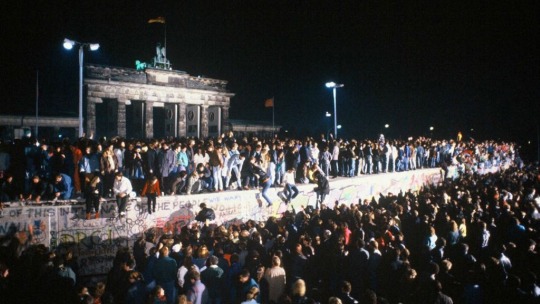
Der 09. November - Der Tag der Deutschen
Kaum ein anderer Tag vereint so viele, für unser Land historisch bedeutsame Ereignisse wie dieser
09.11.1848 - standrechtliche Hinrichtung von Robert Blum
Der republikanische Abgeordnete der Frankfurter Nationalversammlung wird, obgleich er unter parlamentarischer Immunität steht, bei Wien erschossen. Seine Hinrichtung gilt als Symbol für die Niederschlagung der Deutsche Revolution 1848/1849 durch die reaktionären herrschenden Kreise.
09.11.1918 - die Ausrufung der Republik in Berlin
Während der Novemberrevolution 1918 ruft von einem Fenster des Reichstagsgebäudes aus der sozialdemokratische Abgeordnete Philipp Scheidemann die “deutsche Republik” aus. Drei Stunden später proklamiert der Sozialist Karl Liebknecht vor dem Berliner Stadtschloss die “Freie Sozialistische Republik Deutschland”.
09.11.1923 - Hitler-Ludendorf-Putsch in München
In München putscht ein bis dahin unbekannter rechtsradikaler Demagoge namens Adolf Hitler im Verein mit dem reaktionären General Erich Ludendorff gegen die Weimarer Republik. Sein Versuch, die rechtsstaatliche Ordnung analog zu Benito Mussolini in Italien durch einen “Marsch auf Berlin” zu beseitigen, scheitert vor der Feldherrenhalle am Odeonsplatz durch den bewaffneten Einsatz der bayrischen Landespolizei. Vier Polizisten, ein unbeteiligter Passant und fünfzehn Putschisten sterben. Erstmalig werden die Nationalsozialisten einer breiteren Öffentlichkeit bekannt.
09.11.1938 - Reichsprogromnacht
Die Novemberprogrome mit etwa 400 Todesopfern, 1.406 zerstörten Synagogen und jüdischen Gebetsstuben markieren den endgültigen Übergang von der gesellschaftlichen Diskriminierung der jüdischen Bürger im nationalsozialistischen Deutschland zur offenen Gewaltanwendung, die schließlich im Holocaust endete.
09.11.1989 - Der Fall der Berliner Mauer
Auf einer bis dahin eher langweilig verlaufenen Pressekonferenz verliest das SED-Politbüromitglied Günter Schabowski gegen 7 Uhr abends auf Nachfrage des italienischen Journalisten Riccardo Ehrmann einen neuen Entwurf über Reisemöglichkeiten für DDR-Bürger. Der etwas umständliche Wortlaut ist folgender: “Privatreisen nach dem Ausland können ohne Vorliegen von Voraussetzungen (Reiseanlässe und Verwandtschaftsverhältnisse) beantragt werden. Die Genehmigungen werden kurzfristig erteilt. Die zuständigen Abteilungen Pass- und Meldewesen der der Volkspolizeikreisämter in der DDR sind angewiesen, Visa zur ständigen Ausreise unverzüglich zu erteilen, ohne dass dafür noch geltende Voraussetzungen für eine ständige Ausreise vorliegen müssen. Ständige Ausreisen können über alle Grenzübergangsstellen der DDR zur BRD erfolgen.” Der Reporter der “Bild”-Zeitung Peter Brinkmann fragt nach, ab wann dies in Kraft trete. Schabowski, der über den genauen Inhalt der neuen Regelung, die eine Sperrfrist beinhaltet, nicht informiert ist, da er bei deren Beschlussfassung nicht anwesend war, antwortet daher: „Das tritt nach meiner Kenntnis – ist das sofort, unverzüglich.“
Während das Fernsehen der DDR in nüchternen Worten über den Fakt der neuen Reisemöglichkeiten informiert, ist für Hanns Joachim Friedrichs während seiner Moderation der “Tagesthemen” die historische Bedeutsamkeit sofort ersichtlich: “Die DDR hat mitgeteilt, dass ihre Grenzen ab sofort für jedermann geöffnet sind. Die Tore in der Mauer stehen weit offen.“
Im Laufe des Abends versammeln sich immer mehr Menschen vor den Berliner Grenzübergängen und verlangen friedlich aber lautstark das ihnen neu zustehende Recht.
Eine halbe Stunde vor Mitternacht befiehlt Oberstleutnant Harald Jäger, der zuständige Leiter der Grenzübergangsstelle Bornholmer Straße, von seinen Vorgesetzten mit einer Entscheidung allein gelassen und mit Menschenmassen vor der Grenzübergangsstelle konfrontiert, eigenmächtig, sofort alle Kontrollen einzustellen und die Schlagbäume zu öffnen. Bis Mitternacht folgen alle weiteren Berliner Grenzübergangsstellen seinem Vorbild.
Kein einziger Schuss ist gefallen, niemand wurde verletzt. Tausende einander völlig fremde Menschen fallen sich weinend in die Arme.
29 notes
·
View notes
Link
The Beer Hall Putsch, also known as the Munich Putsch,[1][note 1] was a failed coup d'état by Nazi Party (Nationalsozialistische Deutsche Arbeiterpartei or NSDAP) leader Adolf Hitler, Generalquartiermeister Erich Ludendorff and other Kampfbund leaders in Munich, Bavaria, on 8–9 November 1923, during the Weimar Republic. Approximately two thousand Nazis marched on the Feldherrnhalle, in the city centre, but were confronted by a police cordon, which resulted in the deaths of 16 Nazi Party members and four police officers.[2]
Hitler, who was wounded during the clash, escaped immediate arrest and was spirited off to safety in the countryside. After two days, he was arrested and charged with treason.[3]
The putsch brought Hitler to the attention of the German nation for the first time and generated front-page headlines in newspapers around the world. His arrest was followed by a 24-day trial, which was widely publicised and gave him a platform to express his nationalist sentiments to the nation. Hitler was found guilty of treason and sentenced to five years in Landsberg Prison,[4] where he dictated Mein Kampf to fellow prisoners Emil Maurice and Rudolf Hess. On 20 December 1924, having served only nine months, Hitler was released.[5][6] Once released, Hitler redirected his focus towards obtaining power through legal means rather than by revolution or force, and accordingly changed his tactics, further developing Nazi propaganda.[7]
4 notes
·
View notes
Text
In my defense, the cops letting a violent group, even if they are their buddies, the fascists, into Capitol Hill to ransack it for the first time since 1812, was a *bit* of a shock, but when I heard the initial request for the national guard was mysteriously denied? I thought it was going to be like fucking dominos, where after that higher levels of the military would get called and either not respond or openly join the fascists. I thought this was going to be like if Hitler had rolled a Nat 20 when he, Ludendorff and the other jackasses pulled the Beer Hall Putsch, instead of the unsuccessful putsch they actually had. That's why I was so terrified; I thought it was going to keep snowballing. I'm glad to be wrong.
4 notes
·
View notes
Text
“ Il colmo dell’arte di governo per i democratici dei paesi in crisi sembra consistere nell’incassare degli schiaffi per non ricevere dei calci; nel sopportare il minor male, nell’escogitare sempre nuovi compromessi per attenuare i contrasti e tentare di conciliare l’inconciliabile. Gli avversari della democrazia ne approfittano e diventano sempre più insolenti. Essi congiurano alla luce del giorno, organizzano depositi d’armi, fanno sfilare per le strade i loro aderenti in formazioni militari, aggrediscono, dieci contro uno, i capi democratici più odiati. Il governo, “misurando bene le parole per non aggravare la situazione”, deplora i fatti e augura, “per il buon nome del paese”, ch’essi non siano stati premeditati, rivolgendo un appello accorato ai cittadini affinché “la serenità torni negli spiriti”. L’importante, a giudizio dei capi democratici, è di evitare parole e provvedimenti che possano irritare i faziosi e aggravare la situazione. Se la polizia scopre che dei capi politici e militari sono compromessi con l’organizzazione sediziosa e hanno collaborato direttamente alla formazione dei depositi d’armi, il governo diventerà forse audace e, perché serva d’ammonimento, farà arrestare qualcuno dei collaboratori subordinati. I capi stessi giammai, perché equivarrebbe a provocare uno scandalo e a precipitare la catastrofe. Gli uomini responsabili della democrazia sanno ch’essi hanno tutto da perdere e nulla da guadagnare dall’inasprimento dei rapporti politici. Pertanto essi s’illudono di guadagnare tempo praticando la politica dello struzzo. Così la giovane repubblica spagnuola graziò Sanjurjo e mantenne i generali monarchici alla testa dell’esercito, anche quando tutti sapevano che preparavano un colpo di stato. Alla stessa guisa Mussolini non fu mai molestato a causa delle violenze che i fasci, sotto la sua direzione e dietro suo ordine, perpetravano nel paese. Gli ufficiali e generali, iscritti nei fasci, furono conservati nei quadri militari. Non altrimenti in Germania. “Per contribuire alla pacificazione degli animi”, la repubblica tedesca graziò Ludendorff dopo il fallito putsch di von Kapp del 1920 e dopo quello prematuro di Hitler del 1923, e lasciò impuniti i capi dell’organizzazione terrorista “Consul” che ordinarono l’assassinio dei ministri Erzberger e Rathenau, benché nessun dubbio vi fosse sulla loro identità e responsabilità. “
Ignazio Silone, La scuola dei dittatori, Mondadori (collana Oscar n° 736), 1977; pp. 35-36.
NOTA: Il libro fu scritto e pubblicato durante l’esilio dell’autore in Svizzera (Die Schule der Diktatoren, Europa Verlag, Zurigo, 1938) e manifesta la sua opposizione tanto ai fascismi quanto allo stalinismo. Trascorso quasi un quarto di secolo, dopo una profonda revisione e sfrondatura con le quali furono eliminati i riferimenti contingenti e le numerose citazioni dei discorsi di Goebbles, il testo tradotto uscì a puntate sul settimanale culturale Il Mondo nel 1962, quindi nello stesso anno si ebbe l’edizione in volume da Mondadori.
#Ignazio Silone#La scuola dei dittatori#dittature#politica#letteratura italiana del '900#Secondo Tranquilli#antifascismo#letteratura d'esilio#populismi#populismo#saggi#leggere#letteratura italiana del XX secolo#citazioni letterarie#letture#crisi delle democrazie#golpe#colpi di Stato#squadrismo#libri
5 notes
·
View notes